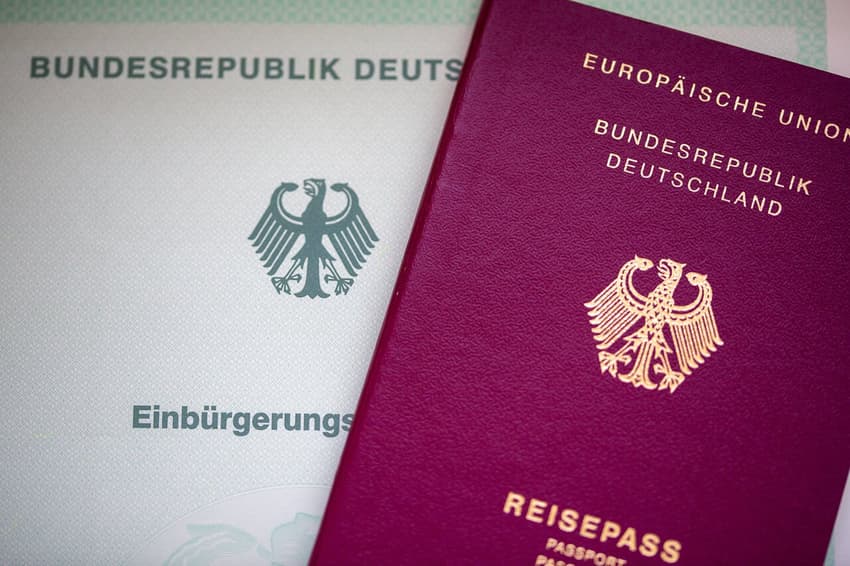German government puts dual citizenship reform back on parliamentary agenda

After removing the citizenship reforms from the agenda amid anti-Semitism debates, the German government has rescheduled the first reading of the landmark dual nationality law for December 1st this year.
The first reading of the bill had originally been scheduled for November 9th, but was quietly taken off the parliamentary plan after the Free Democrats (FDP) raised questions about anti-Semitism in the wake of the Israel-Hamas war.
"The question mark that they have right now is if the new citizenship act is good enough to prevent anyone who is anti-Semitic from getting German citizenship," SPD MP Hakan Demir, one of the politicians working on the legislation, told The Local's Germany in Focus podcast at the time.
One idea on the table was reportedly to include an explicit acknowledgement of Israel's right to exist as part of the naturalisation process - a proposal also put forward by the opposition CDU party.
READ ALSO: Could your political views bar you from becoming a German citizen?
This would go one step further than the current proposal, which prevents people who commit "xenophobic, racist or anti-Semitic acts" from ever becoming German.
It is unclear whether this change has been added to the law.
With or without amendments, Germany's sweeping reform of citizenship laws will now go to the Bundestag on Friday, December 1st for the first of three readings. On the third reading, the bill will go to a vote, which it is expected to pass.
Parliamentarians say there is no need for the legislation to pass through the upper house, or Bundesrat, since its contents don't affect the day-to-day running or financing of the federal states.
The government is aiming to pass the legislation by April next year.
READ ALSO: INTERVIEW: 'We are determined to pass German citizenship reforms despite delays'
Once the law comes into force, it will end an existing ban on holding multiple nationalities, meaning both EU and non-EU citizens will be able to naturalise as Germans without giving up their current citizenships.
It will also see the standard residence requirements for citizenship reduced from eight years to five, or even to three in exceptional circumstances.
The children of foreigners will automatically gain Germany citizenship once their parents have been in the country for five years, and people over the age of 67 will no longer have to pass a formal B1 language test.
Comments
See Also
The first reading of the bill had originally been scheduled for November 9th, but was quietly taken off the parliamentary plan after the Free Democrats (FDP) raised questions about anti-Semitism in the wake of the Israel-Hamas war.
"The question mark that they have right now is if the new citizenship act is good enough to prevent anyone who is anti-Semitic from getting German citizenship," SPD MP Hakan Demir, one of the politicians working on the legislation, told The Local's Germany in Focus podcast at the time.
One idea on the table was reportedly to include an explicit acknowledgement of Israel's right to exist as part of the naturalisation process - a proposal also put forward by the opposition CDU party.
READ ALSO: Could your political views bar you from becoming a German citizen?
This would go one step further than the current proposal, which prevents people who commit "xenophobic, racist or anti-Semitic acts" from ever becoming German.
It is unclear whether this change has been added to the law.
With or without amendments, Germany's sweeping reform of citizenship laws will now go to the Bundestag on Friday, December 1st for the first of three readings. On the third reading, the bill will go to a vote, which it is expected to pass.
Parliamentarians say there is no need for the legislation to pass through the upper house, or Bundesrat, since its contents don't affect the day-to-day running or financing of the federal states.
The government is aiming to pass the legislation by April next year.
READ ALSO: INTERVIEW: 'We are determined to pass German citizenship reforms despite delays'
Once the law comes into force, it will end an existing ban on holding multiple nationalities, meaning both EU and non-EU citizens will be able to naturalise as Germans without giving up their current citizenships.
It will also see the standard residence requirements for citizenship reduced from eight years to five, or even to three in exceptional circumstances.
The children of foreigners will automatically gain Germany citizenship once their parents have been in the country for five years, and people over the age of 67 will no longer have to pass a formal B1 language test.
Join the conversation in our comments section below. Share your own views and experience and if you have a question or suggestion for our journalists then email us at [email protected].
Please keep comments civil, constructive and on topic – and make sure to read our terms of use before getting involved.
Please log in here to leave a comment.